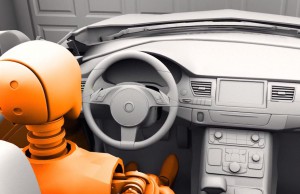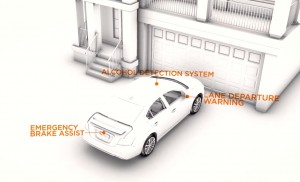
NHTSA is developing the Driver Alcohol Detection System for Safety (DADSS) to prevent drunk drivers from being able to start their cars.
The National Highway Traffic Safety Administration unveiled a prototype system for cars that can detect if the driver’s blood-alcohol concentration level is beyond the legal limit and prevent the vehicle from starting.
In partnership with several automakers, the safety agency, also known as NHTSA, is developing the Driver Alcohol Detection System for Safety (DADSS), which is a noninvasive system aimed at detecting when a driver is above the legal alcohol limit. The technology has been in development since 2008.
While it is often in the headlines for its role in automotive recalls, NHTSA is responsible for the overall safety of U.S. roadways and projects like this are part of its mission, according to officials. The agency unveiled the prototype in Washington D.C. yesterday and it is exploring two ways to check the driver’s BAC level: a breath-based system and a touch-based system.
The breath test performs an instantaneous and contact-free measurement of alcohol in the driver’s exhaled breath. While the touch system measures blood alcohol levels under the skin’s surface by shining an infrared-light through the fingertip. The test is completed in less than one second.

Safety officials hope that DADSS will be available just like any other safety feature on new cars someday.
“There is still a great deal of work to do, but support from Congress and the industry has helped us achieve key research and development milestones,” said Mark Rosekind, NHTSA administrator. “DADSS has enormous potential to prevent drunk driving in specific populations such as teen drivers and commercial fleets, and making it an option available to vehicle owners would provide a powerful new tool in the battle against drunk driving deaths.”
(To see more about how apps will keep drivers safer, Click Here.)
While getting help from automakers and endorsements from many organizations, the system does have its detractors, including the American Beverage Institute. The organization notes that BAC rises over time so someone who has five or six drinks in less than an hour will often be able to start their car.
“The recommendation that all cars should come pre-installed with alcohol detection technology is misguided, and its eye-popping life-saving potential is based on a series of assumptions that are far from reality,” the group said.
(Click Here for the latest details on the Takata airbag recall efforts.)
They note that even under the best of circumstances, there are likely to be thousands of malfunctions leaving drivers stuck in parking lot somewhere, potentially for hours. On top of that, these systems may cost as much as $400.
According to the agency, the DADSS Alcohol Detection System will:
- detect when a driver is intoxicated with a blood alcohol concentration (BAC) at or above 0.08 — the legal limit in all 50 states — and prevent a car from moving.
- be made available as a safety option in new vehicles, much like automatic braking, lane departure warnings, and other advanced vehicle technologies.
- be quick, accurate, reliable, and affordable.
- be seamlessly integrated into vehicles and not affect normal driving behavior.
- have customized features to give parents a new level of security and additional peace of mind knowing that if their children have been drinking, they won’t be able to drive.
(Fiat Chrysler admits to missing five recall deadlines. Could face major fines. Click Here for that breaking story.)
The system could also be programmed to a zero-tolerance level for drivers under 21 years of age. Ideally, the system would be added to cars much the same way other safety equipment, like airbags, anti-lock brakes and electronic stability control. Rosekind predicted that Americans would wonder why vehicles weren’t equipped with the technology sooner.

This all sounds good but until they can actually deliver a reliable system that meets the goals, it’s just PR to get more tax dollars for research.
I’d be willing to bet that most people who are DUI can find a means to circumvent these types of systems such as having a friend start the car for them and then switching drivers or wearing gloves so the system can’t measure the BAC via skin tests. All of these issues need to be resolved.
In addition the likelihood of those who drink and drive ever buying this as an option is zero. Thus the only likelihood of this expensive equipment being purchased would be by concerned parents who don’t drive DUI themselves. Mandating that all vehicles have this system is not going to make most consumers happy as they are being forced to pay for someone else’s poor personal choices be it those who drink and drive or bureaucrats trying to save the world from itself.
BTW, I 110% in support of getting DUIs off the roads but we need systems that actually work and can’t be circumvented easily. Most in the beverage industry only care about revenues. They are unscrupulous. How many college kids did every year from alcohol poisoning or related alcohol deaths because venues allow outrageous and uncivil excess consumption of alcohol. The excuse the venues use is that these young adults will continue the deadly practices some place else so the establishment might as well cash in on the deadly practices of many teenagers and college students. What a mentality… from the beverage industry.
While it’s true that someone could have 4-6 drinks in a short period of time and still start their car, a proper system could continue to monitor the driver while driving and place the car in limp mode and then stop it completely – naturally with all hazard flashers blinking and perhaps a siren or other sound device to alert drivers of a DUI behind the wheel. Maybe On-Star or similar could phone local police automatically with the driver’s location and vehicle I.D. when a DUI is behind the wheel?
I can see the good that such a system would do. However, I don’t see every new car buyer wanting to pay for it. Making it an actual option would help; but then I can see dealers ordering ALL their stock with this option, thus inflating the sales price. New cars are already expensive enough – where is the end?
You can bet that the Feds will try to get this mandatory.
BETTER IDEA: how about a STUPIDITY DETECTOR!!
You can’t fix STUPID so states just give them a driver’s license…it’s part of the entitlement mentality.
I like the OnStar idea. With the proven technology already in cars today; a sensor that would trigger an automatic call to the police would be a be better approach.
We can’t do that ’cause it be invasion of privacy. We gotz to wait until they kill or injure someone before we can conclude they is DUI.